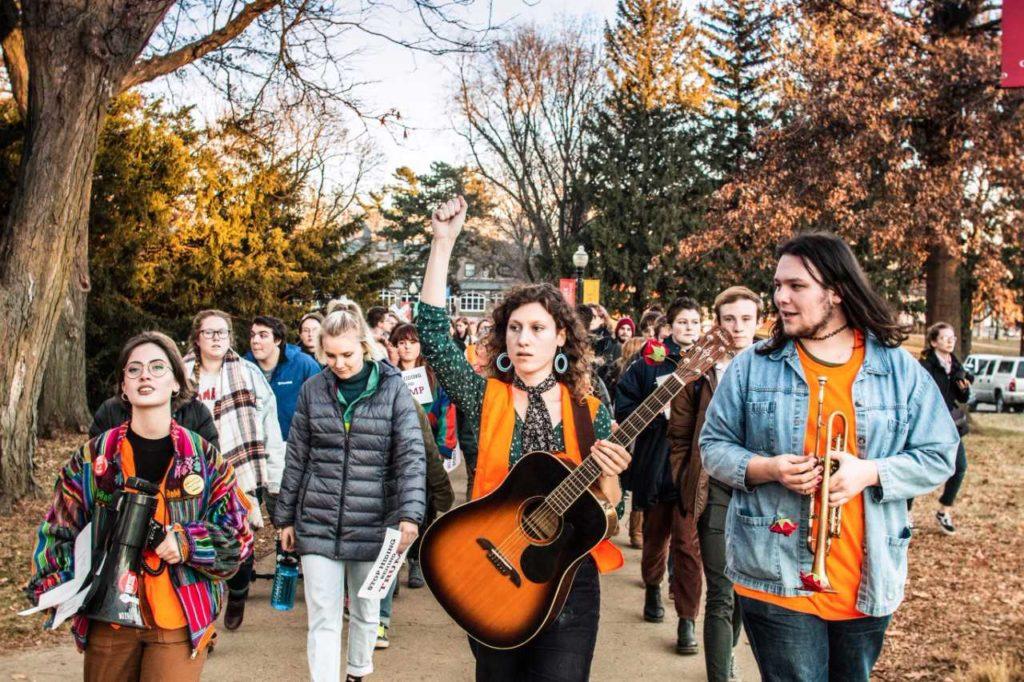
The 2018 fall semester was an eventful one for the Union of Grinnell Student Dining Workers (USGDW), as their attempts towards expansion reached the attention of national news sources including NPR, Teen Vogue and Vice. The union’s goal of expansion was to grow into the representative bargaining power for all on-campus student employees, beyond its current scope of dining services employees.
After a campus-wide election voted to expand the union to allow membership from all jobs on campus, UGSDW ultimately withdrew their petition after ongoing disagreements with the College. The petition for expansion would have been presented to the regional office of the National Labor Relations Board in Minneapolis, and The NLRB’s verdict could have had the power to change the national precedent on students’ ability to unionize at private colleges and universities.
With the dawn of a new semester, UGSDW executive board members say that they are not giving up on their goal of expansion.
“We never promised to give up, we never said that we were done. All we said was we are no longer asking the government to help us, and that has no effect on our ability to take any actions, to strike, any of our legally protected rights, and it is not changing our overall goal at the moment. We are still trying to expand,” said UGSDW Executive Board Member Jacob Schneyer ’21.
On Jan. 21, UGSDW published a report titled “Racial Discrimination at the Spencer Grill” to their website. The report, conducted by Executive Board Member Cory McCartan ’19, alleges that students of color at the Spencer Grill face harsher levels of discipline and termination than their white peers. UGSDW receives notifications of any student employee firings, so after noticing a potential pattern, union members requested anonymous information from Grinnell’s Human Resources office to analyze further.
At the Spencer Grill, student employees face a “three cuts” system in which cuts serve as penalizing actions. After receiving three cuts, a student is fired.
“What I found was that white and non-white student workers are about equally as likely to get those first two cuts, but that third cut — which is when you should be fired — suddenly now employees of color and international student workers are much more likely to get that third cut compared to their white counterparts,” said McCartan.
According to the report, white student employees are also more likely to receive a second chance after three cuts, sometimes not facing termination until four or five cuts.
The College has since responded to the report through a special campus memo. According to the memo, “the College takes the concerns raised in UGSDW’s report very seriously” but in its analysis of the report found “the limited data insufficient to draw meaningful conclusions.” However, an independent third-party will conduct an investigation overseen by the College’s Interim Chief Diversity Officer, Leslie A. Gregg-Jolly.
“The administration said they’re open to talking about this with us, and we’re going to really press them on specific things we can do to stop this from happening going forward,” McCartan said.
UGSDW had also anticipated beginning the spring semester with their first action early on, hoping to travel to the University of Iowa on Jan. 23. President Raynard Kington was invited to give the MLK Human Rights Week Distinguished Lecture at the University, and union members planned to distribute information outside of the lecture in response. The action was ultimately canceled due to poor road conditions.
“We kind of felt like this was a betrayal of MLK’s values because he was very much involved in radical labor activism, and he had this understanding of different forms of oppression being linked together. … Because of that, we think it was really inappropriate to have someone who is actively engaged in trying to reduce labor rights of people who are trying to gain them give a lecture like that,” Schneyer said.
Schneyer noted that UGSDW had no plans to picket the event or to discourage people from attending the lecture. They hoped to distribute flyers as well as meet with the University of Iowa Labor Center and graduate student union in a show of solidarity.
In terms of the future, UGSDW plans to continue its goal of expansion on-campus and is open to potential compromises, such as expanding to represent some but not all student employees. In addition, executive board members hope to meet with Kington as well as the College’s trustees this semester.
“We can continue to put pressure on the administration and make them realize that denying students and student workers their rights is the wrong move for Grinnell College as an institution. Regardless of any economic impact it might have, our values should be a priority for us. The cost of a union is not going to change the way Grinnell College operates in a significantly detrimental way. The only thing that it does is affirm our values and our commitment to social responsibility,” said UGSDW President Quinn Ercolani ’20.
Other future plans include bargaining on the dining contract as well as a potential student employee strike. Overall, UGSDW members hope to engage more with students and hear how they can improve their mission.
“We really want to reach out to all members of the Grinnell community and make sure that we’re doing our jobs as the representatives, both on the surface but also in our goal of expansion of all the student workers on campus. We want to make sure that we’re doing it the way that people want us to be doing it,” Ercolani said.


























































